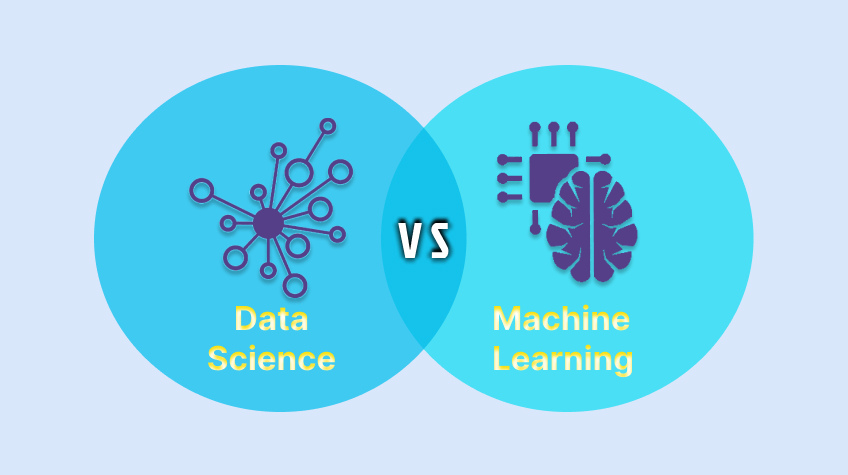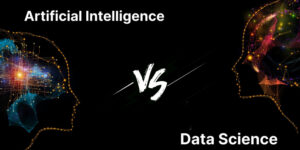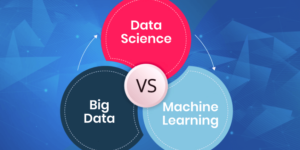
Data Science vs. Machine Learning have become increasingly popular in recent years. These are the two ideas that are considered to be the most significant in the field of technology. Using these two technologies, people are building new products, services, and other types of infrastructure systems.
Both Data Science and Machine Learning have become an indispensable part of business world. Almost every company is rushing to include these two technologies into its operations.
So, if you want to know what is the difference between Data Science vs. Machine Learning, then read this post.
This post has all that you need to know about the differences between data science and machine learning.
Let’s get a grip on the definitions of these terms before we move on to discussing the distinctions between them.
Table of Contents
- What exactly is “Data Science?”
- Why is Data Science Important?
- What exactly is “Machine Learning?”
- Why Is Machine Learning Important?
- Data Science vs. Machine Learning: The Difference Between The Two
- Key Skills Needed To Be A Data Scientist
- Key Skills Needed To Be A Machine Learning Engineer
- Role and Responsibilities of Data Scientists
- Role and Responsibilities of Machine Learning Engineers
- Is there any relationship between Data Science and Business Intelligence?
- What are the different career options in the Fields of Machine Learning and Data Science?
- Which field, data science or machine learning, offers higher salaries?
- How to choose between Data Science and Machine Learning?
- Data science vs. Machine Learning: which one is superior?
What exactly is “Data Science?”
Data science is a subfield of computer science that focuses on the study of data and how to derive meaning from it. It is one of the most important fields today. It is a method for analyzing large amounts of data. What happened, why it happened, what will happen next, and what can be done with the outcomes are all questions that can be better addressed with the help of this analysis, which is crucial to data scientists.
It combines principles and practices from various disciplines, including Artificial Intelligence, mathematics, statistics, and computer engineering.
Data scientists employ a variety of algorithms, techniques, systems, and tools to gain insights from both structured and unstructured data. This data is then used by businesses, the government, and other organizations to help improve products and services, generate revenues, construct superior infrastructure and public systems, and accomplish a variety of other goals.
Why is Data Science Important?
Data Science is one of the most important fields today. The combination of different tools, methodologies, and technologies into a single field is what makes data science such an essential field.
The success of firms now depends heavily on their ability to effectively utilise data. Data scientists use techniques like pattern recognition and data mining to extract useful insights from massive amounts of data that may be either structured or unstructured. Data science is significant because of the wide variety of fields it may be applied to, from simple tasks like asking Siri or Alexa for recommendations to more complex purposes like controlling a self-driving car.
Computer Science, Predictive Analysis, Statistics, Inference, Machine Learning techniques, and cutting-edge technologies are all included in the broad scope of Data Science.
What exactly is “Machine Learning?”
Machine Learning is the field of artificial intelligence. It uses algorithms to mine data for insights into future patterns in order to make forecasts. Software engineers use models built into the code to perform statistical analysis and better understand data trends.
Machine Learning is used to make predictions about users’ interests and desires by analyzing their past actions and then making suggestions about relevant items, services, and articles for them to check out. Many renowned brands, including Google, Microsoft, Baidu, and other, uses Machine Learning to stay ahead in the game.
Machine learning is an integral part of the rapidly expanding discipline of data science. The methods and concepts of Machine Learning are used in both data science and non-data-science-related domains. Whenever needed, data scientists frequently employ machine learning in their work, whether to assist with the analysis of trends or to obtain more information more quickly.
Why Is Machine Learning Important?
Machine learning is significant in today’s business scenario. It helps companies better understand customer behaviour, streamline internal operations, and create new products. Machine Learning has gained immense popularity in the past few decades. It has become an integral part of the business world. Many businesses, including Facebook, Apple, Microsoft, Baidu, Google, and Uber, now use machine learning in order to differentiate themselves from their competitors.
Data Science vs. Machine Learning: The Difference Between The Two
Data science is a collection of algorithms, tools, and machine learning approaches that let you identify common hidden patterns from the raw data. Machine learning, on the other hand, is a subfield of computer science that focuses on system programming to automatically learn and improve with experience.
Data science is the process of extracting valuable information from large datasets using a wide range of statistical, computational, and mathematical techniques. Machine learning, on the other hand, refers to a system that can learn from data through self-improvement and without the logic being explicitly coded by the programmer. This type of system is called an autonomous learning system.
Data science is an interdisciplinary area that extracts information from a variety of structured and unstructured datasets through the application of scientific methods, algorithms, and computer systems. Machine Learning is the field of computer science that studies algorithms and statistical models.
Manual methods may be employed in data science, despite their limited utility. On the other hand, manually developing machine learning algorithms is difficult.
Data science is not a subset of AI because it focuses on different types of problems. The field of Machine Learning, on the other hand, falls within the umbrella of AI.
Data science is a way that can help you produce insights from data while taking into account all of the complexity of the actual world, and machine learning is a method that can help you forecast the outcome for new database values.
Data science allows you to generate insights from data while also dealing with the complexities of the real world. Machine learning is a technique for acquiring knowledge automatically by analyzing large amounts of data and making predictions about the future.
The vast majority of input data is produced in a human-readable format, and this data is subsequently read and analyzed by humans. The data that is fed into machine learning is transformed, particularly for the algorithms used.
Data science is a full process. The entire process of data science includes machine learning as one of its individual steps.
Data science makes use of large quantities of RAM and solid-state storage to avoid I/O bottlenecks. In the field of machine learning, GPUs are used to speed up time-consuming vector calculations.
Key Skills Needed To Be A Data Scientist
The data scientist profile is one of the most lucrative profiles today. To work as a data scientist, you’ll need to develop abilities in programming and data analytics.
Here are some of the essential skills that you’ll need to develop in order to succeed as a data scientist:
- Expertise in multiple programming languages, including Python, R, SQL, and SAS, among others.
- Experience working with both organized and unstructured data in a variety of settings.
- Database management and data processing abilities.
- Ability to process and analyze data in accordance with the requirements of the business.
- Understanding of mathematical concepts, statistical data, and statistical probability
- Familiarity with the algorithms and models used in machine learning
- Ability to collaborate and communicate effectively.
Key Skills Needed To Be A Machine Learning Engineer
If you want to have a successful career as a machine learning engineer, you will need to have the following skills:
- Knowledge and experience in computer science, particularly with regard to data structures, algorithmic design, and architectural design
- A solid understanding of statistical methods and probability
- Familiarity with the software engineering and system design fields
- Expertise in multiple programming languages, including Python, R, and others.
- Ability to model and analyse data.
Role and Responsibilities of Data Scientists
Here is a list of roles and responsibilities of Data Scientists:
- Information regarding the management of unstructured data
- Collect information and evaluate its usefulness.
- practical expertise in the use of the SQL database-coding language
- Capable of comprehending a wide variety of analytical functions
- The application of data mining to Processing, cleaning, and checking the data’s integrity.
- Collaborate with experienced DevOps consultants in order to assist customers in operationalizing their models.
Role and Responsibilities of Machine Learning Engineers
Here is a list of roles and responsibilities of Machine Learning Engineers:
- Familiarity with the development of data and statistical modelling
- Acquiring an understanding of algorithms and putting them to use
- Processing based on natural language
- Familiarity with data architecture design
- Text representation approaches
- A comprehensive understanding of various programming techniques
- Familiarity with probability and statistical methods
- Expertise in machine learning systems as well as deep learning technology
- Deep understanding of machine learning tools and algorithms
The Bottom Line…
So, there you have it, the difference between Data Science vs. Machine Learning. Hopefully, this article will help you make a better career choice. Both the concepts go hand in hand and are very much in demand due to the benefits they offer to businesses.
Of course, both Data Science and Machine Learning offer lucrative career opportunities as they are regarded as the most important technologies in the modern world.
Let’s now take a look at the FAQs related to Data Science and Machine Learning.
FAQs
1. Is there any relationship between Data Science and Business Intelligence?
Yes, there is a significant relationship between Data Science and Business Intelligence. Data systems integrated into the architecture of an organization are known as business intelligence systems. When properly integrated, business intelligence tools facilitate data science across the board.
Business intelligence systems automatically extract data from a variety of sources and store it in a single repository. Each of these repositories serves as a source of data for a data scientist. Moreover, these repositories lessen the amount of work that a data scientist must put in to gather data.
2. What are the different career options in the Fields of Machine Learning and Data Science?
Both Machine Learning and Data Science are in the mainstream today. You may use machine learning to become a machine learning engineer, a software developer specializing in ML, a natural language processing scientist, or a data scientist.
Data science can prepare you for a variety of careers, including business intelligence development, data analysis, data architecture, data engineering, and machine learning engineering, among others.
Remember that for most positions, you’ll need a solid background in mathematical theory, statistical methodology, and the essentials of software engineering. Nevertheless, some tasks may require some level of specialization. This means Machine Learning engineers will need to have more programming skills.
3. Which field, data science or machine learning, offers higher salaries?
When it comes to earnings, of course, Machine Learning Engineers earn more than Data Scientists. Because of the nature of their job roles and responsibilities. Machine Learning Engineers are often expected to have specialized knowledge.
The field of data science has a greater emphasis on statistics, whereas machine learning places a greater emphasis on computer science in addition to statistics. Definitely, Machine Learning Engineers job is more complex than that of a Data Scientist’s job.
4. How to choose between Data Science and Machine Learning?
When it comes to choosing between Data Science and Machine Learning, it’s difficult to choose one. As a matter of fact, both Data science and machine learning are complementary fields that complement one another. As a Data Scientist, you need to have at least a basic understanding of machine learning to be able to model and comprehend the massive amounts of big data that are generated each and every day.
The field of data science is extremely comprehensive but not especially challenging. The role of a data scientist can be broken down into a variety of subfields as it consists of numerous stages.
You can develop your skills as a data scientist even if you don’t have any prior experience with programming if you learn the appropriate methods, tools, and processes for working with data and acquire the requisite subject matter expertise. Learning R is crucial if you want to get started as Data Scientist.
5. Data science vs. Machine Learning: which one is superior?
Each field has its own importance in the business world. Of course, the roles and responsibilities for both profiles vary, but there are certain similarities. For instance, if you want to get started as Data Scientist, you will need to have some understanding of Machine Learning to model and comprehend huge amounts of big data.
If you enjoy working with large amounts of data and are interested in pursuing a career in the business world, you should probably consider data science. If you would like to work as an engineer designing algorithms using machine learning, then you should probably look into the machine learning field. The choice is absolutely yours! You will need to understand which field entices you the most.






